Overview
Digital transformation in banking is not just beneficial; it is essential for enhancing client experiences, streamlining operations, and maintaining competitiveness. IT managers must embrace comprehensive changes in processes and culture to navigate this landscape effectively.
How can institutions leverage emerging technologies like AI and cloud computing to address the challenges posed by legacy systems and regulatory compliance? The successful transformation of banking institutions hinges on fostering a culture of innovation. By doing so, they can ensure their survival and growth in the ever-evolving financial landscape.
Therefore, it is imperative to act now and integrate these technologies to thrive.
Introduction
In the rapidly evolving landscape of banking, digital transformation has transcended the realm of choice—it’s now a critical necessity for survival and growth. Financial institutions are compelled to enhance customer experiences, streamline operations, and uphold their competitive edge. The integration of cutting-edge technologies is paramount.
This article explores the multifaceted aspects of digital transformation within the banking sector, addressing critical areas that demand immediate attention.
- How can banks improve customer engagement through AI-driven solutions while overcoming the challenges posed by legacy systems?
- With insights from industry leaders and a focus on innovative platforms like Avato’s Hybrid Integration Platform, we will highlight how banks can navigate this transformative journey effectively and position themselves for future success.
Understanding Digital Transformation in Banking
The digital transformation in banking represents a pivotal technological advancement in finance, fundamentally altering how financial institutions operate and deliver value to their clients. This transformation is essential for enhancing client experiences, streamlining operations, and maintaining competitiveness in an increasingly dynamic market. IT managers must recognize that embracing technological change transcends mere tool adoption; it necessitates a comprehensive revision of processes, culture, and customer interaction strategies.
For instance, banks are increasingly leveraging mobile banking apps, AI-driven customer service solutions, and advanced data analytics to meet evolving customer expectations and enhance service delivery. A striking statistic reveals that nearly 60% of banking leaders view legacy infrastructure as the foremost barrier to business growth, highlighting the urgent need for digital transformation to address this challenge. Avato’s Hybrid Integration Platform is instrumental in this modernization by maximizing and extending the value of legacy systems, simplifying complex integrations, and significantly reducing costs.
By 2025, successful examples of technological change in banking will likely emerge from institutions that cultivate a culture of innovation. This involves encouraging experimentation, providing continuous training, and recognizing employees who contribute to modernization efforts. Such a culture not only enhances employee engagement but also fosters a proactive approach to adopting new technologies, ultimately leading to improved operational efficiency.
Avato’s platform facilitates this by enabling real-time monitoring and alerts regarding system performance, ensuring that financial institutions can swiftly address operational challenges.
The impact of technological transformation on user experience is profound. As financial institutions harness electronic technologies, they can offer personalized services, accelerate response times, and elevate overall customer satisfaction. The global online banking market is projected to reach $22.3 trillion by 2026, expanding at a compound annual growth rate (CAGR) of 8.5%.
This growth underscores the substantial opportunities available to banks willing to embrace digital transformation and adapt to the evolving landscape, particularly through the secure integration of isolated legacy systems enabled by Avato.
Expert insights emphasize the critical role of technological advancement in the context of digital transformation in banking. Vikram, Vice Chair and US Financial Services Industry Leader at Deloitte, notes that the incorporation of technological innovations is vital for operational efficiency and customer engagement. Additionally, challenges such as regulatory implementation and organizational leadership uncertainty, which account for 20% of the obstacles faced by organizations, must be addressed to facilitate successful change.
Avato’s Hybrid Integration Platform is designed to tackle these challenges, providing a robust foundation for secure and effective system integration.
In conclusion, the ongoing evolution in banking, driven by digital transformation, is not merely a trend but a crucial requirement for survival and growth in the sector. By comprehending its implications and actively engaging in the change process, IT managers can position their institutions for success in the evolving financial landscape, leveraging solutions like Avato’s to bridge the gap between legacy systems and modern expectations.
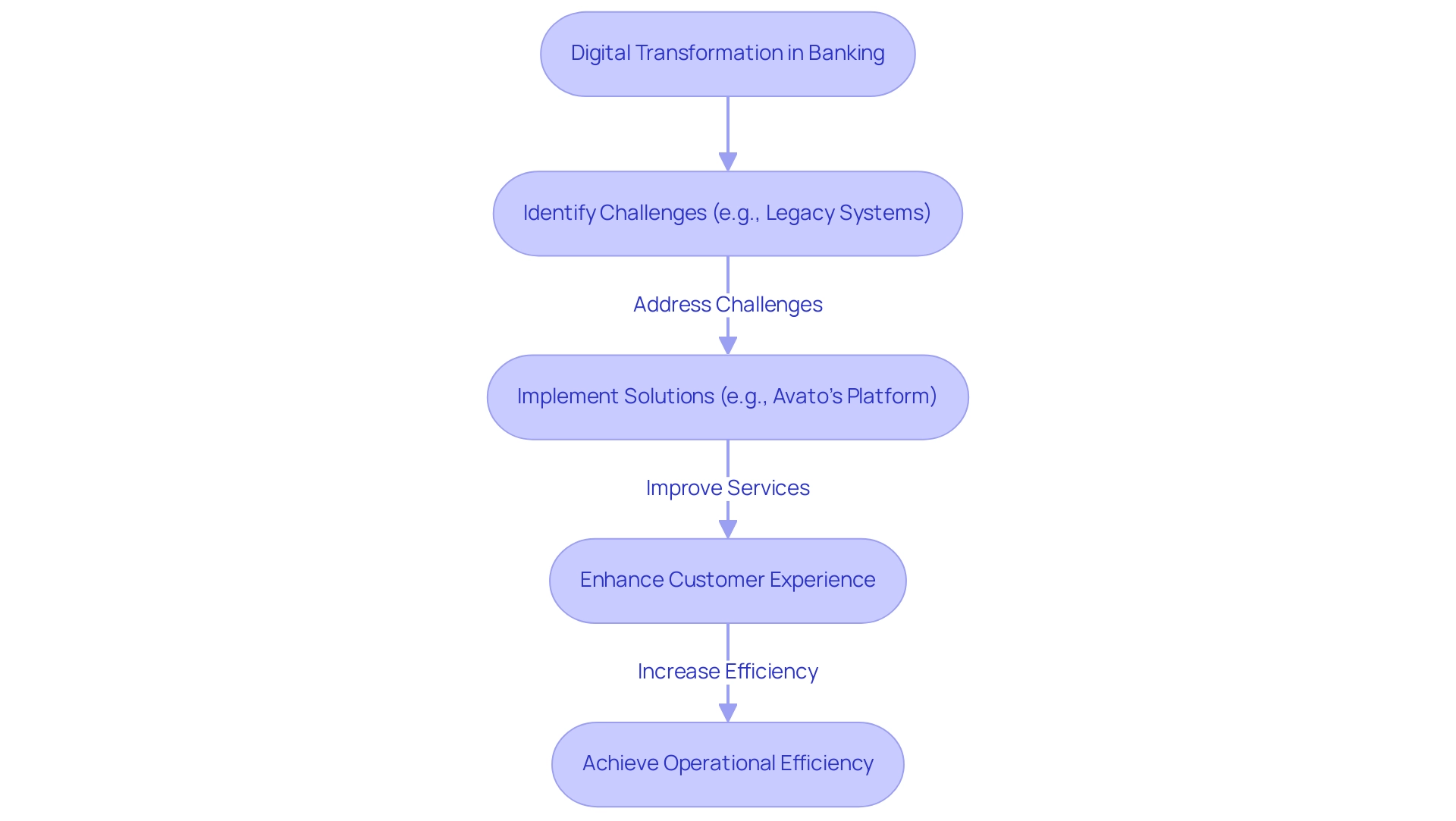
Key Areas of Digital Transformation in Banking
The key areas of digital transformation in banking encompass several critical dimensions essential for enhancing competitiveness and operational effectiveness:
-
User Experience: A primary focus is on enhancing user interfaces and personalizing services to align with client expectations. With over 80% of Nubank’s clients successfully managing various tasks independently through its self-service model, it is evident that empowering individuals leads to improved satisfaction and loyalty. Moreover, the integration of generative AI has seen a 60% increase in its use for user experience, particularly in developing sophisticated chatbots and virtual assistants, further enhancing engagement and support.
-
Operational Efficiency: Streamlining processes through automation and data analytics is vital for reducing costs and accelerating service delivery. Notably, Deutsche Bank’s commitment to its US$2.8 billion Operational Efficiency plan has already yielded US$1.3 billion in savings by the second quarter of 2024, showcasing the tangible benefits of digital transformation in banking initiatives. Avato plays a crucial role here, delivering a connected foundation that simplifies and modernizes operations, allowing financial institutions to balance speed of integration with the sophistication required to future-proof their technology stack.
-
Risk Management: The implementation of advanced technologies for fraud detection and compliance monitoring is crucial in today’s regulatory landscape. Financial institutions are increasingly adopting sophisticated tools to mitigate risks and enhance security measures, ensuring client trust and regulatory compliance. Avato’s architecture is designed for secure transactions, making it a reliable partner for financial institutions and other sectors. Avato’s solutions facilitate real-time oversight and analysis, which are crucial for efficient risk management.
-
Data Management: Utilizing big data analytics enables financial institutions to obtain valuable insights into client behavior and preferences. This capability not only aids in tailoring services but also enhances decision-making processes, driving more effective marketing strategies and product offerings. The use of generative AI for document processing and report generation is streamlining operations and enhancing productivity across various departments, with over half of financial professionals now utilizing these capabilities.
-
Innovation: The development of new products and services that utilize emerging technologies such as blockchain and artificial intelligence is essential for staying ahead in a competitive market. As financial institutions investigate creative solutions, they can more effectively satisfy changing client needs and take advantage of new growth possibilities. The transformative impact of AI adoption in the financial sector is evident, with significant revenue growth and efficiency enhancements reported by early adopters.
In 2025, the emphasis on these areas will be paramount, especially as 26% of senior executives identify high costs as a significant barrier to technological transformation. Addressing these challenges while focusing on enhancing customer experience and operational efficiency will be critical for financial institutions aiming to thrive amid the digital transformation in banking. Furthermore, the case study on growth opportunities in wealth management illustrates that despite leading financial institutions holding only a 32% market share, there are significant opportunities for growth, albeit challenged by competition and fee transparency issues.
Avato’s integration solutions can assist financial institutions in navigating these challenges and capitalizing on emerging opportunities.
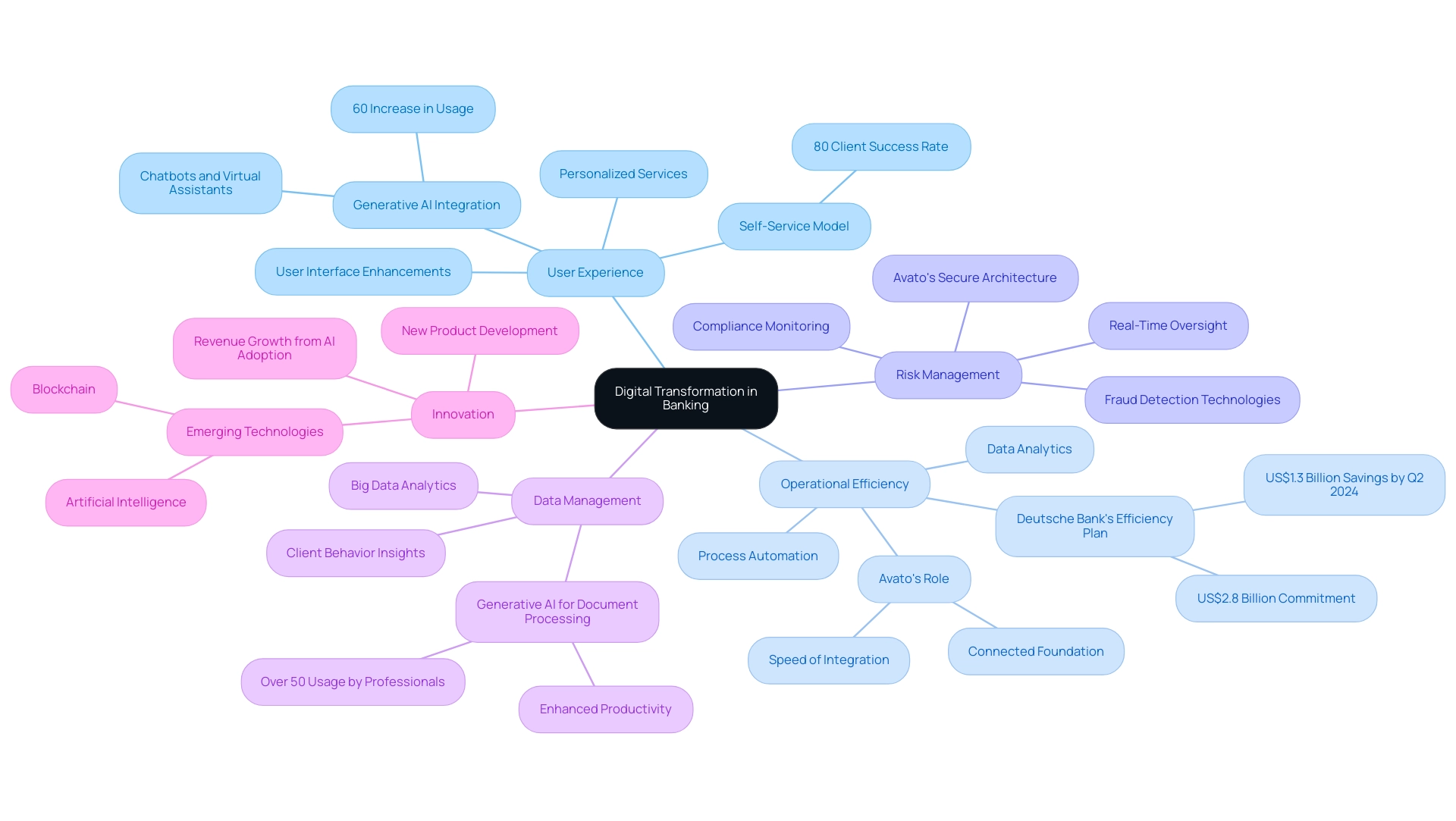
Technologies Driving Digital Transformation
Several technologies are pivotal in driving digital transformation in banking, each contributing uniquely to the industry’s evolution:
-
Artificial Intelligence (AI): AI is revolutionizing customer interactions through chatbots and predictive analytics, significantly improving risk assessment processes. Notably, applications of AI in finance are projected to reduce the demand for lower-skilled positions by over 50%, highlighting its transformative impact on workforce dynamics. Furthermore, the applied AI in finance market is expected to grow from approximately $9.62 billion in 2023 to an estimated $59.70 billion by 2032, indicating a transformative shift in the banking and finance industry. However, key risks associated with AI in finance, such as security and privacy breaches (46.6%) and the potential failure of AI systems (40.5%), must be addressed to ensure successful implementation.
-
Cloud Computing: This technology provides unmatched scalability and flexibility, allowing financial institutions to deploy applications swiftly and efficiently. As organizations increasingly transition to the cloud, success stories are arising, demonstrating how financial institutions utilize cloud solutions in the context of digital transformation in banking to improve operational efficiency and client service.
-
Blockchain: By enhancing security and transparency in transactions, blockchain technology is particularly influential in payments and identity verification. Its ability to provide a tamper-proof ledger is reshaping trust in financial transactions.
-
Robotic Process Automation (RPA): RPA automates repetitive tasks, allowing staff to focus on more strategic roles. This shift not only boosts productivity but also enhances job satisfaction by reducing mundane workloads.
-
Data Analytics: Advanced data analytics tools provide deep insights into customer behavior, enabling financial institutions to tailor marketing strategies and improve decision-making processes. As the market for applied AI in finance is expected to grow significantly, the importance of data-driven strategies cannot be overstated.
In 2025, the incorporation of these technologies will be essential for the digital transformation in banking as financial institutions manage the intricacies of technological change. Avato’s Hybrid Integration Platform plays a vital role in this landscape, offering secure and efficient system integration that prepares financial institutions for the challenges of open banking. It is essential for banks to leverage existing systems rather than discarding them, as this approach can save time and resources while enhancing integration efforts.
As noted by industry expert Alex Singla, “It will be interesting to see what happens when more companies begin to follow the road map for successful gen AI implementation in 2025 and beyond.” This roadmap will be critical for organizations aiming to thrive in this evolving landscape.
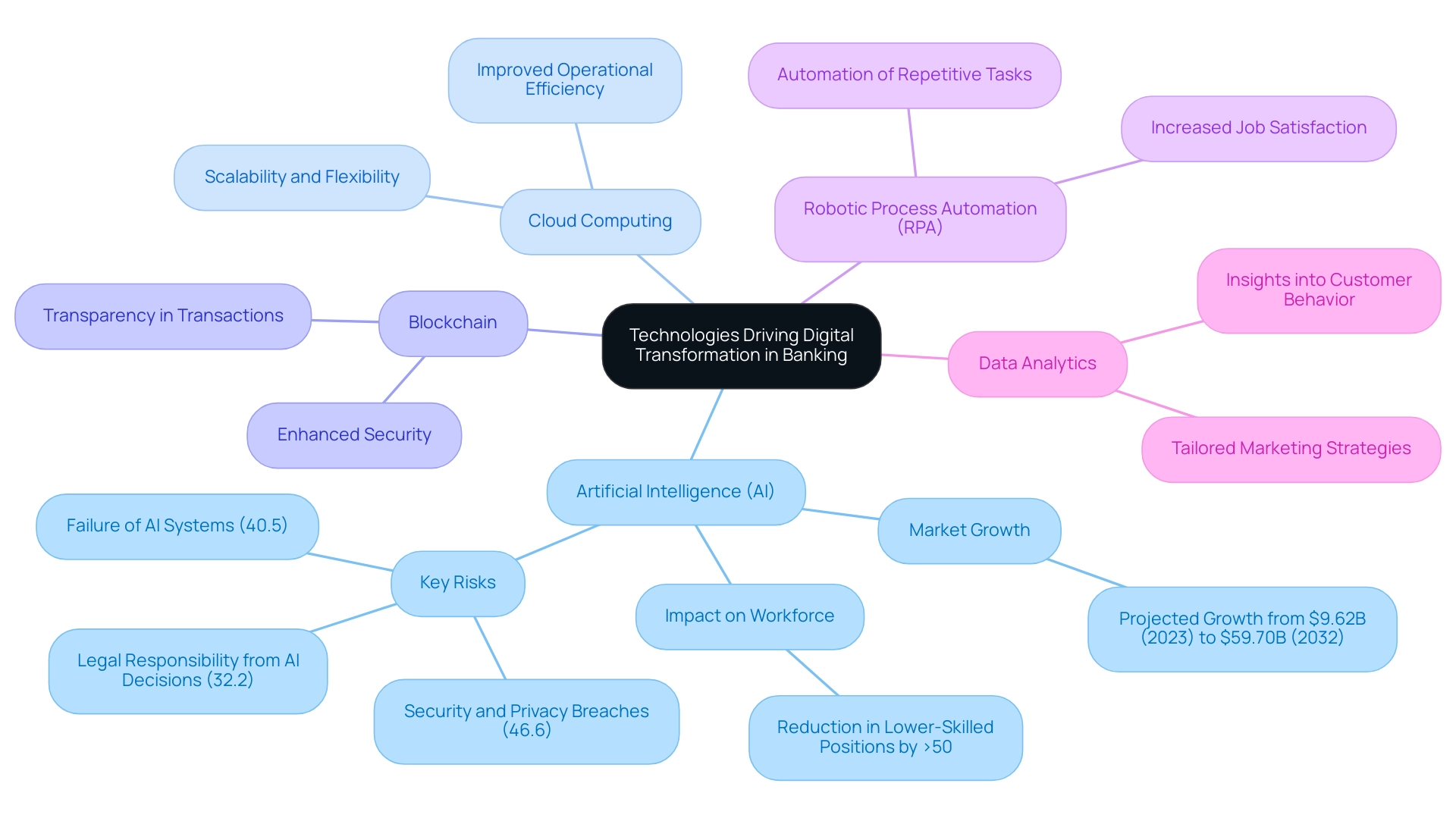
Cultural Transformation: Aligning People with Technology
Cultural change serves as a crucial foundation for digital transformation in banking, especially as we approach 2025. IT managers must prioritize several key strategies to ensure the successful integration of new technologies and processes:
-
Employee Engagement: Actively involving staff in the transformation journey fosters a sense of ownership and commitment. Studies indicate that organizations with high employee involvement are significantly more likely to reach their technological advancement objectives. Alarmingly, only about 30% of technology shifts achieve their intended goals, often due to poor execution and a lack of employee engagement. Notably, 70% of digital changes fail for similar reasons. By prioritizing engagement, banks can markedly enhance their chances of success. Furthermore, according to the Quixy Editorial Team, 85% of employees are engaged at work, underscoring the critical need for effective employee engagement strategies.
-
Training and Development: Continuous training is vital for equipping employees with the necessary skills to effectively utilize new technologies. As the banking landscape evolves, ongoing development programs ensure that staff remain competent and confident in their roles. This strategic investment in human capital not only boosts morale but also enhances overall productivity.
-
Leadership Support: Strong advocacy from leadership is essential for driving cultural change. Leaders must not only endorse change initiatives but also embody the desired cultural shifts. Their commitment sets a tone that encourages employees to embrace change and align with the organization’s strategic goals.
-
Open Communication: Establishing transparent channels for feedback and discussion is vital for addressing employee concerns and fostering collaboration. Open communication builds trust and ensures that all voices are heard, which is particularly important in a sector where change can be met with resistance.
Integrating these strategies can lead to a more involved workforce, ultimately propelling the success of technology initiatives and supporting digital transformation in banking. As organizations aim to become more composable businesses—an objective that 60% of mainstream companies will pursue by 2024—the focus on cultural change will be paramount in navigating the complexities of digital transformation in banking. Additionally, the case study titled “The Cost of Employee Disengagement” highlights the significant economic impact of disengaged employees, reinforcing the necessity of a well-executed employee engagement strategy.
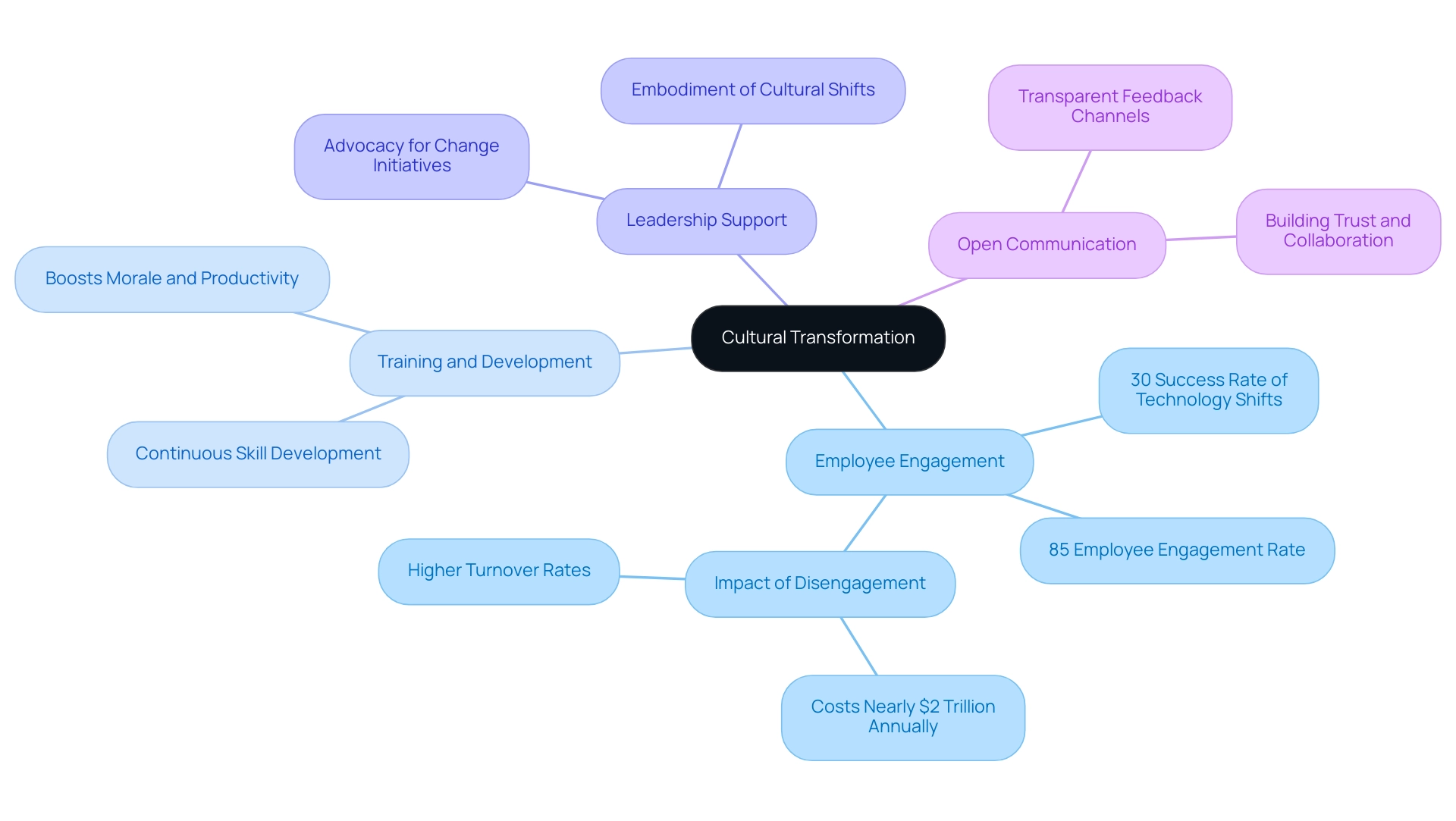
Challenges and Obstacles in Digital Transformation
Digital evolution in financial institutions presents a myriad of challenges that organizations must navigate to remain competitive in 2025.
-
Legacy Systems: A significant hurdle for many financial entities is the reliance on outdated technology, complicating the integration of modern solutions. These legacy systems impede operational efficiency and create barriers to adopting innovative technologies that can enhance customer experiences. Avato’s dedicated hybrid integration platform simplifies these complexities, enabling banks to unlock isolated assets and create business value through seamless data connectivity.
-
Regulatory Compliance: The banking sector is heavily regulated, and navigating these complex regulations can significantly slow down change initiatives. Integrating risk and compliance considerations into early transformation efforts is crucial for mitigating risks and eliminating inefficiencies that inflate operational costs. Avato’s expertise in hybrid integration ensures compliance is woven into the fabric of technological initiatives, facilitating smoother transitions.
-
Cultural Resistance: Change often meets resistance, particularly in established organizations. Employees accustomed to traditional processes may hesitate to embrace new workflows, stalling progress and hindering the successful implementation of digital strategies. Embracing modern banking technology, such as Avato’s solutions, is essential for overcoming this fear of change and fostering a culture of innovation.
-
Data Security Concerns: With the increasing digitization of banking services, protecting sensitive information has become paramount. Any transformation initiative must prioritize robust security measures to safeguard against potential breaches and maintain client trust. Avato ensures 24/7 uptime for critical integrations, vital for operational efficiency and data security, allowing financial institutions to focus on enhancing customer experiences without compromising safety.
-
Skill Gaps: The rapid pace of technological advancement can leave employees unprepared to adapt to new systems and processes. Continuous training and development are essential to equip staff with the necessary skills to thrive in a digitally transformed environment. Avato assists organizations in this transition by supplying the tools and resources necessary to close these skill gaps.
In 2025, diversified financial institutions are anticipated to excel compared to their counterparts due to multiple revenue streams and a stronger brand presence, aiding them in managing deposit rates and competition effectively. However, midsize and regional financial institutions may struggle with high exposure to troubled sectors, such as commercial real estate, highlighting the critical need for effective technological transformation strategies that align with digital transformation in banking. As Sudhakaran Jampala notes, tackling these challenges directly is crucial for financial institutions to utilize their legacy systems while ensuring compliance and security in the context of digital transformation in banking initiatives.
This approach, backed by Avato’s innovative hybrid integration solutions, will be essential for financial institutions aiming for digital transformation in banking to thrive in an increasingly competitive environment.
Moreover, the incorporation of generative AI into financial operations is becoming increasingly vital. With a 60% rise in its application for user experience, especially in creating advanced chatbots and virtual assistants, Avato’s solutions can assist financial institutions in utilizing this technology to optimize operations and boost productivity. By addressing these challenges and leveraging innovative technologies, banks can future-proof their operations and deliver exceptional customer experiences.
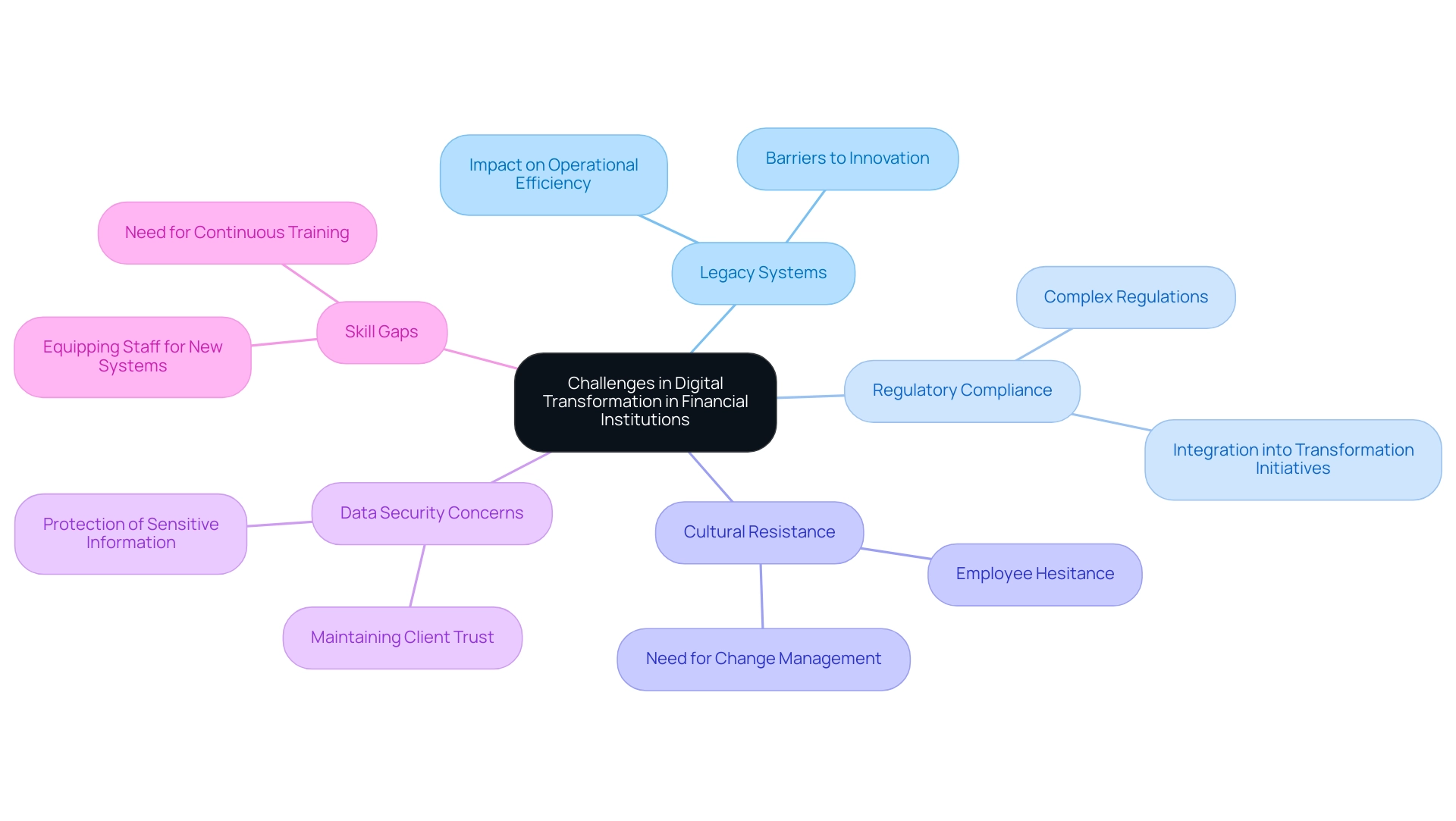
Preparing for Digital Transformation: Strategies for Success
To effectively navigate the complexities of digital transformation, IT managers in the banking sector should adopt the following strategies:
-
Develop a Clear Vision: Crafting a detailed roadmap is essential. This roadmap should articulate the specific goals and objectives of the change, ensuring that all stakeholders understand the intended outcomes and the path to achieving them.
-
Engage Stakeholders: Active involvement of key stakeholders from various departments is crucial. Their insights and support can cultivate alignment across the organization, which is vital for the success of change initiatives. As noted by industry expert Marcus Schwarz, “The impact of digital banking on stakeholders is profound, influencing various aspects of the financial ecosystem.”
-
Invest in Training: Equipping employees with the necessary skills through comprehensive training programs is fundamental. This investment not only enhances individual capabilities but also cultivates a culture of continuous learning, essential for adapting to new technologies and processes. Training should also focus on the use of Avato’s hybrid integration platform, ensuring staff are well-prepared to leverage its capabilities for seamless integration and modernization.
-
Pilot Projects: Implementing small-scale pilot projects allows organizations to test new technologies and processes in a controlled environment. This approach minimizes risk and provides valuable insights that can inform broader implementation strategies. Employing Avato’s organized requirements management can assist in defining these pilot projects clearly, ensuring they align with overall change objectives.
-
Monitor Progress: Regular assessment of transformation initiatives is critical. By tracking user activity and quantifying ROI through real-time reporting, organizations can gauge the effectiveness of their strategies and make necessary adjustments to optimize outcomes. Avato’s hybrid integration platform can streamline this process, providing the necessary tools to monitor integration success and compliance with security protocols.
Incremental modernization strategies, such as wrapping legacy systems with innovation layers, can facilitate a smoother transition to next-generation systems. Avato’s approach emphasizes leveraging existing assets while integrating new technologies, ensuring that financial institutions do not discard valuable legacy systems unnecessarily. By offering in-situ assistance, financial institutions can empower workers and ensure adherence, ultimately resulting in enhanced client service and operational efficiency.
As banks continue to reduce excess capital and explore partnerships to maintain customer relationships, the significance of stakeholder engagement in these change efforts cannot be overstated. Successful technological change in banking, driven by digital transformation in banking, relies on a collaborative method that emphasizes the needs and perspectives of all participants involved, especially as open banking becomes a reality in Canada.
Call to Action: To learn more about how Avato’s hybrid integration platform can assist your technological advancement journey, download our resources now and discover strategies for enhancing security and compliance in your integration efforts.
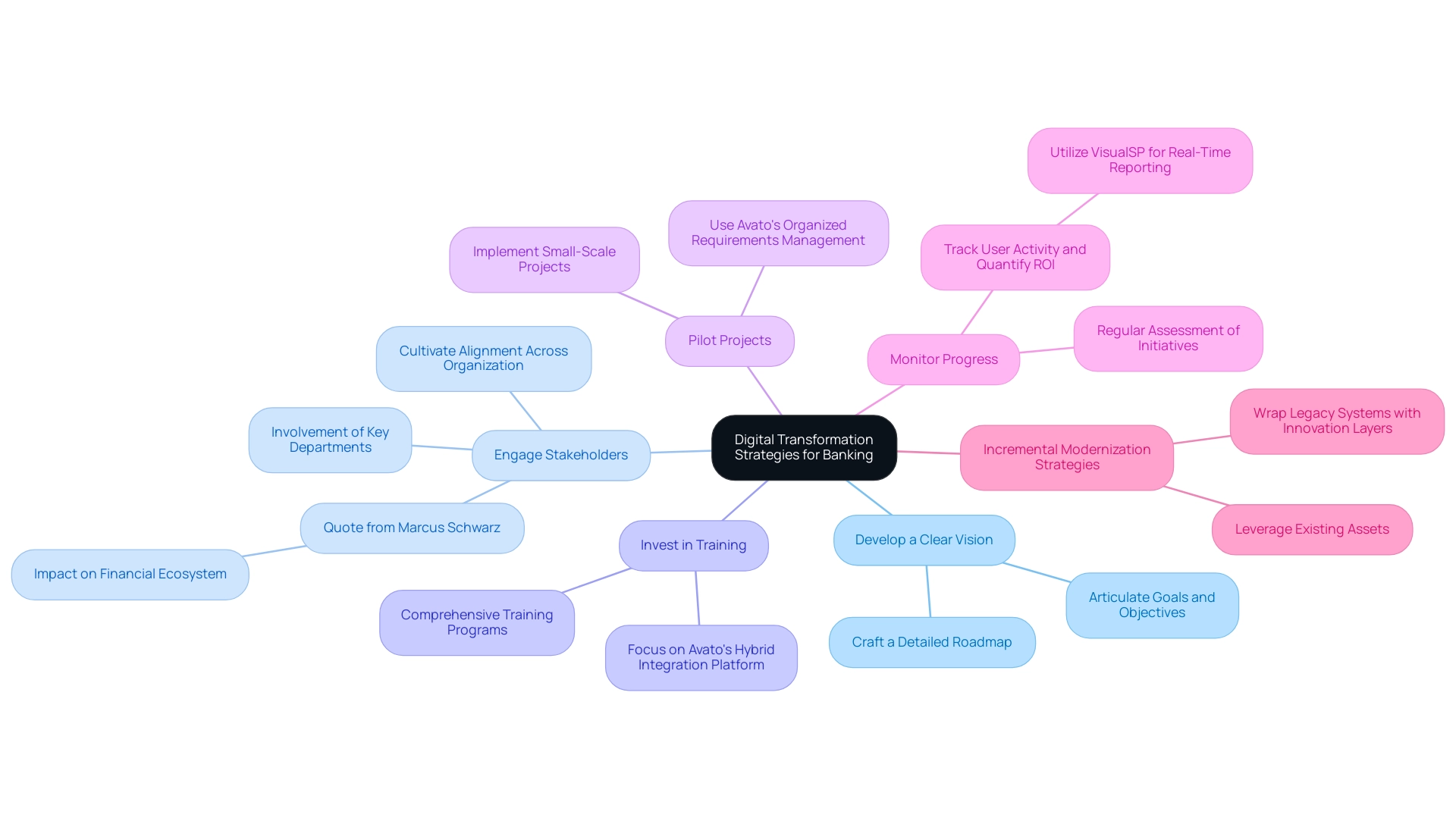
Case Studies: Successful Digital Transformation in Banking
Several banks have successfully navigated digital transformation, showcasing innovative strategies that have reshaped their operations and customer interactions:
-
DBS Bank: By adopting a digital-first approach, DBS Bank has significantly transformed its operations. This shift has resulted in improved client satisfaction and operational efficiency, positioning the bank as a leader in the digital banking space. The outcomes of this transformation are clear, with a significant rise in engagement and a streamlined service delivery model, supported by advanced technologies like generative AI, which has experienced a 60% increase in usage for enhancing experience.
-
Capital One: Capital One has effectively leveraged AI and data analytics to enhance client engagement and streamline internal processes. This strategic use of technology has not only enhanced client interactions but has also led to significant cost reductions, showcasing the power of data-driven decision-making in the banking sector. Their integration of generative AI has played a crucial role in this success.
-
Siam Commercial Bank: Implementing a thorough online strategy, Siam Commercial Bank has enhanced user experience and expanded its market share. This initiative emphasizes the significance of a holistic approach to digital transformation, where every aspect of the client journey is considered and optimized, further enhanced by Avato’s hybrid integration solutions that simplify complex integrations and provide cost-effective solutions.
-
JPMorgan Chase: With significant investments in advanced technologies, JPMorgan Chase has modernized its banking services, leading to enhanced security and increased customer trust. This focus on technology not only addresses current market demands but also prepares the institution for future challenges in the financial landscape, showcasing the transformative impact of AI on financial services.
These case studies illustrate the diverse strategies employed by financial institutions to achieve successful digital transformation. As the industry evolves, it is clear that becoming a composable business is a strategic goal for many, with projections indicating that by 2024, 60% of mainstream companies will prioritize this approach. This trend emphasizes the necessity for financial institutions to adopt reliable and future-proof technology stacks, as demonstrated by these organizations, to adapt to changing demands and maintain a competitive edge in the financial services sector.
Furthermore, the challenges faced by banks in supporting the real economy, particularly in light of the COVID-19 pandemic, are highlighted in the case study titled “Challenges and Opportunities in Bank Liquidity Creation.” This emphasizes the importance of liquidity creation as a critical factor for addressing financing dilemmas and supporting long-term economic development.
In this context, Avato’s capability to simplify complex projects has been commended by individuals like Gustavo Estrada, who noted its effectiveness in delivering results within desired time frames and budget constraints. Furthermore, Tony Leblanc from the Provincial Health Services Authority commented on Avato’s professionalism and expertise, emphasizing the importance of integration solutions in enabling successful technological transformation in banking, especially through the utilization of generative AI for improved user experience and operational efficiency.
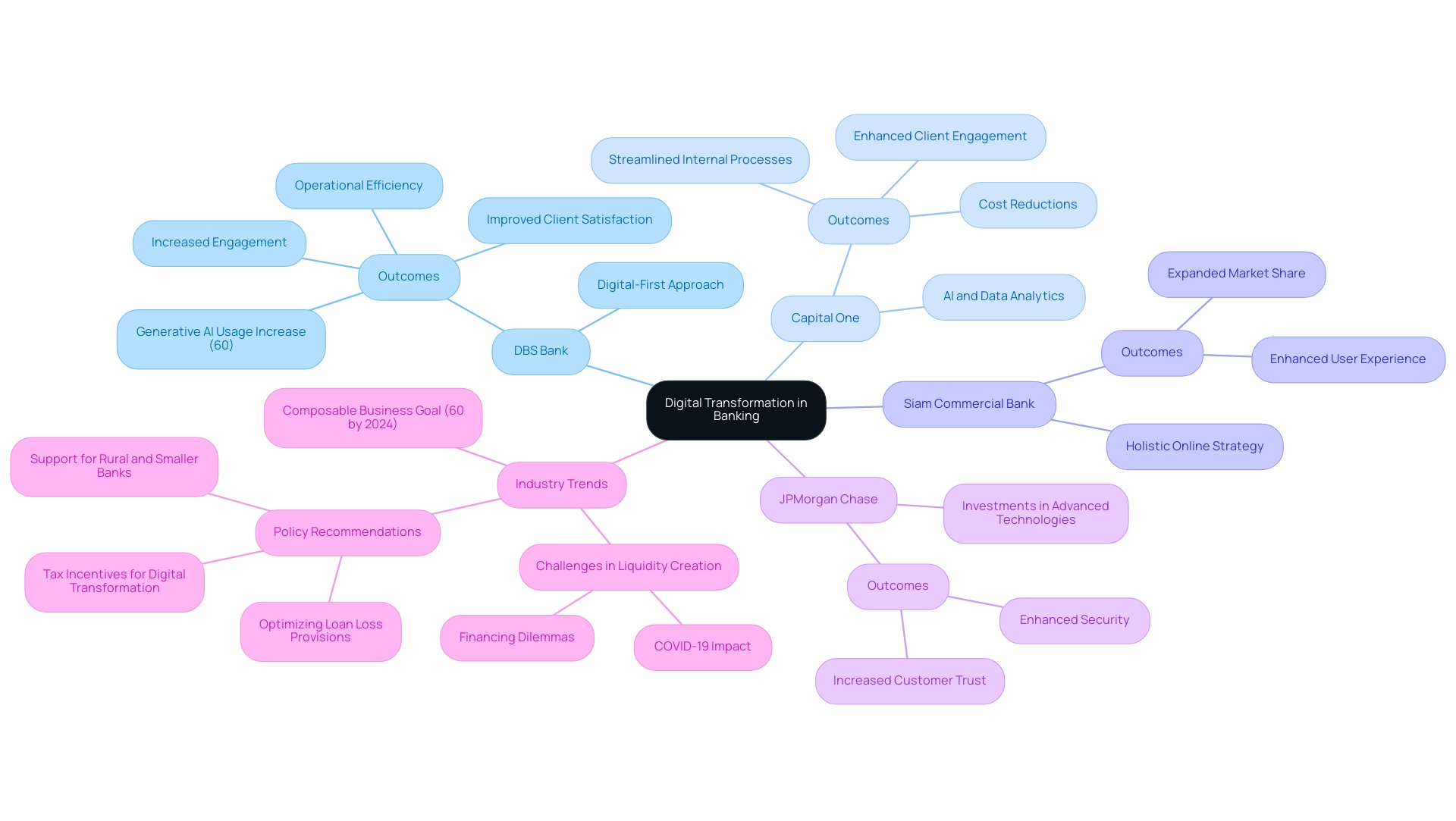
Future Trends in Digital Banking: What IT Managers Should Know
The future of digital banking is being shaped by several key trends that are set to redefine the industry landscape:
-
Increased AI Integration: Artificial Intelligence is poised to revolutionize customer interactions by enabling hyper-personalization and automating routine processes. This shift not only enhances customer satisfaction but also streamlines operations, allowing banks to respond more swiftly to market demands. Avato’s dedicated hybrid integration platform plays a crucial role in this transformation, simplifying the integration of AI technologies into existing systems.
-
Embedded Finance: The integration of financial services into everyday applications is becoming increasingly prevalent. This trend enhances accessibility, allowing consumers to engage with financial products seamlessly within their daily digital experiences, thereby broadening the reach of banking services. Avato’s solutions enable financial institutions to excel in this area by unlocking isolated assets and creating integrated client experiences.
-
Sustainability Initiatives: As consumer awareness of environmental issues grows, financial institutions are prioritizing sustainable practices and products. This shift not only meets customer expectations but also positions financial institutions as responsible corporate citizens, which is becoming a critical factor in customer loyalty. Avato supports these initiatives by offering integration strategies that assist financial institutions in future-proofing their systems and aligning with sustainability goals.
-
Regulatory Changes: The banking sector is continuously adapting to evolving regulatory landscapes. Recent proposals, such as alterations to capital requirements, are anticipated to raise common equity tier 1 ratios by roughly 9% for global systemically important institutions. Staying ahead of these changes is essential for compliance and operational integrity. Avato’s expertise in stakeholder engagement and process modeling ensures that banks can navigate these complexities effectively.
-
Cybersecurity Enhancements: With the rise of online banking comes an increased focus on cybersecurity. As financial institutions expand their online footprints, robust security measures are imperative to protect sensitive customer data from emerging threats. This is particularly crucial as the industry faces challenges related to exceeding budgets and cybersecurity threats, alongside regulatory compliance. Avato’s integration solutions are intended to improve security frameworks, ensuring that financial institutions can protect their operations while adopting technological advancements.
These trends underscore the importance of strategic planning and technological investment for the success of digital transformation in banking. For example, the tokenization of financial assets is a significant case study illustrating how technological advancement can improve liquidity and expand market opportunities, despite the regulatory and technical challenges involved. As Gustavo Estrada noted, “Avato has simplified complex projects and delivered results within desired time frames and budget constraints,” highlighting the significance of effective integration solutions.
As banks navigate these trends, leveraging advanced technologies like AI will be critical for the digital transformation in banking and maintaining a competitive edge.
Additionally, banking IT managers may have questions regarding how Avato’s hybrid integration platform can specifically address their unique challenges. Common inquiries include how to mobilize stakeholders effectively, the right technologies to use for accurate modeling of current and ideal states, and strategies for future-proofing systems to integrate new tools with existing assets. Avato’s commitment to addressing these concerns is rooted in its foundational values of dedication and innovation, ensuring that financial institutions are well-equipped to thrive in a rapidly evolving landscape.
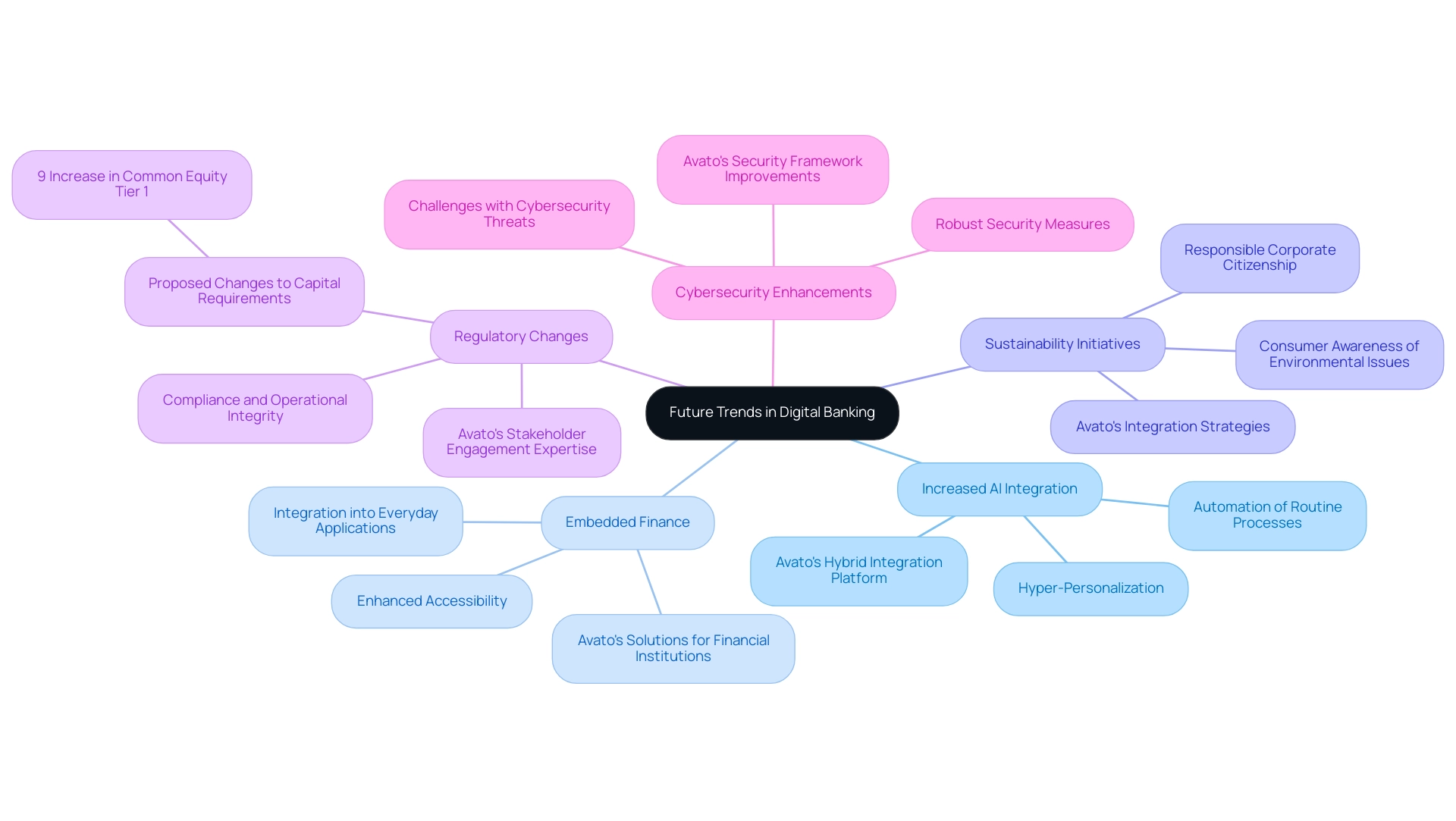
Conclusion
Digital transformation in banking is an imperative that cannot be ignored. As financial institutions navigate the complexities of modern technology and customer expectations, the integration of digital solutions becomes essential for survival and growth. Key areas such as:
- Customer experience
- Operational efficiency
- Risk management
- Data management
- Innovation
must be prioritized to enhance competitiveness and foster a culture of continuous improvement.
The challenges posed by legacy systems, regulatory compliance, and cultural resistance highlight the need for a strategic approach to transformation. By leveraging advanced technologies like AI, cloud computing, and blockchain, banks can streamline operations and deliver personalized services that meet evolving customer demands. Furthermore, fostering employee engagement and providing ongoing training are critical components to ensure that staff are equipped to embrace the new digital landscape.
Successful case studies from institutions like:
- DBS Bank
- Capital One
- JPMorgan Chase
demonstrate the tangible benefits of embracing digital transformation. These organizations not only enhanced customer satisfaction but also improved operational efficiency through innovative strategies. As the banking sector continues to evolve, the focus on sustainability and cybersecurity will further shape the future of digital banking.
Ultimately, the journey towards digital transformation is not merely a trend; it is a fundamental shift that will define the future of banking. Institutions that embrace this change, supported by robust platforms like Avato’s Hybrid Integration Platform, will position themselves to thrive in an increasingly competitive environment. By prioritizing integration, innovation, and customer-centric strategies, banks can unlock new growth opportunities and ensure long-term success in the digital age.

